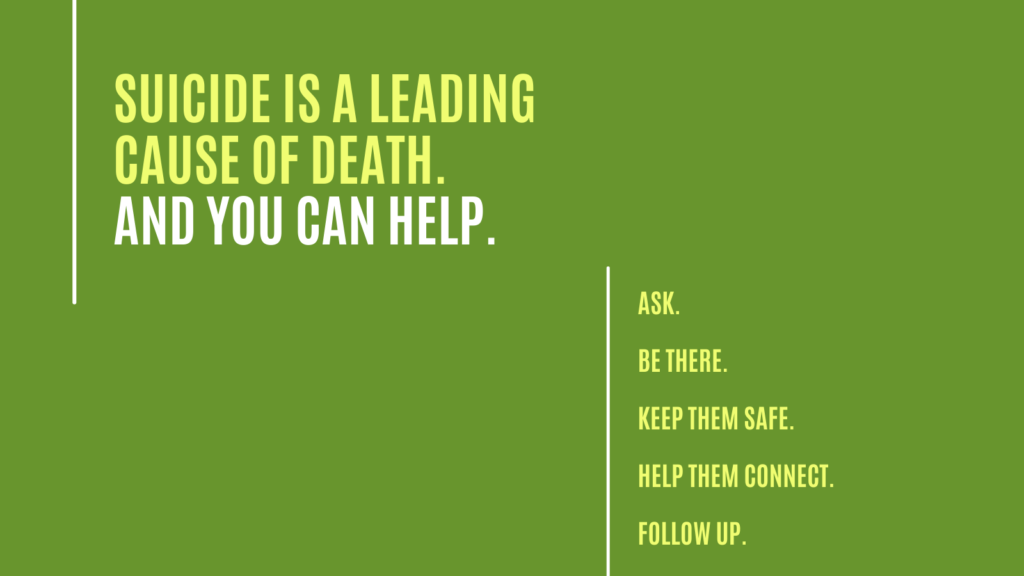September is Suicide Prevention Month and you can be the one to make a difference in the life of a friend or family member who may be thinking about suicide. By raising awareness, reducing the stigma, and encouraging well-informed action, we can all help save lives.
Looking at the statistics, it’s hard to face. Coming to terms with the level of youth committing suicide today is like a cold douse of water. We naturally want to look away and think about something pleasant. But the reality is, there’s a son or daughter behind each of those numbers. There is a life that was cut too short, a promise that did not come to fruition.
Suicide is a topic our society must face and act upon.
According to the CDC, the rate of suicide among youth aged 10-24 was about 6.8 per 100,000 until 2007, then it rose sharply to 10.7 between 2007 to 2018. Experts agree that the global COVID-19 pandemic has only increased levels of social isolation and anxiety in youth, compounding an already alarming issue. Although suicide rates since 2018 are still under study, the CDC found that suicide attempts for girls 12-15 rose 26% during the summer of 2020 and by 50% during the winter of 2021.
Researchers and child experts are studying the causes for this startling increase in youth depression and suicide. Some consider it may be an effect of increased expectations of high achievement for youth, or an effect of social media and the 24-hour news cycle. As experts search for root causes, the good news is there are simple, effective ways you can help the hurting youth and adults you know.
Relationships matter—the human connection is one of the most powerful buttresses against suicide.
You don’t need to be an expert to effectively intervene. The fact that you care is the most powerful tool you can offer. If there is someone in your life you think might be considering suicide, use these five steps from the National Suicide Prevention Lifeline to help:
Ask
“Are you thinking about killing yourself?” It seems like a difficult question, but studies show asking this decreases the rate of suicide. It offers a lifeline to someone who is possibly not seeing clearly due to their depression, and it shows that person that you’re open to them speaking about it.
Keep them safe
Intervening in the depressed youth’s environment helps them successfully get through a challenging time. Working to reduce access to lethal items creates safety. Asking about their plan helps guide the steps needed to keep the youth safe in the present.
Be there
Listening to what the person is feeling without judgment is extremely powerful at reducing suicide. Oftentimes, the driving force behind suicide is isolation and thinking no one understands. Your willingness to be there and listen can help.
Help them connect
Suicidal youth need treatment to recover. The National Suicide Prevention Lifeline (1-800-273-TALK) is a great place to start and will connect them with available resources. Engaging family, friends, spiritual leaders, and mental health professionals is also important.
Stay connected
Checking in after the crisis has passed has been shown to help reduce further suicidal thoughts and behaviors. Knowing someone is concerned makes a difference.
What mental health experts know is getting involved with someone who is suffering works and saves lives. There is a vital need for our community to have the knowledge, understanding, and confidence to engage those who may be at risk.
To continue raising awareness, CGC Jax has joined in a suicide prevention project called Talking Communities. Lead by Starting Point Behavioral Health and funded by Florida Blue, CGC is proud to partner with Clay Behavioral Health Center, Epic Behavioral Health, and Gateway Behavioral Health Services to reduce suicide in our community. Each agency has trained professionals who will lead community group trainings to increase awareness of suicide, as well as provide information on how to intervene and help connect with appropriate care. Evidence-based programs such as Youth Mental Health First Aid; Question, Persuade, and Refer (QPR); and It’s Time To Talk About It (ITTTAI) will be offered over three years in our Northeast Florida community.
If you are thinking about suicide, or are worried about a friend or loved one, reach out. The Lifeline is free, confidential, and available 24/7. Call 1-800-273-TALK (8255) or click here.
